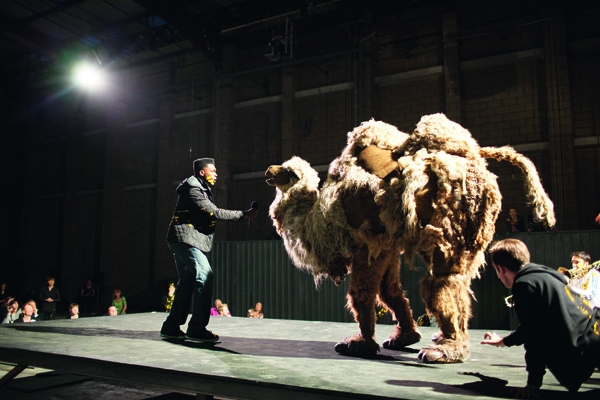Arriving for the world première of Stockhausen’s opera Mittwoch aus Licht (Wednesday from Light), we were greeted by the sight of two Bactrian camels, delightful and patient creatures, standing almost immobile for at least an hour while many visitors inspected them, before leaving in Joseph’s Amazing Camels coach. The one we saw later on stage was a pantomime camel, out of which, unzipped, a man stepped, after the animal had done an elaborate dance and been offered champagne. Zany and utopian, this is characteristic Stockhausen as I remember his works from the 1970s, before his long semi-eclipse, as people lost patience with his pretensions, his extreme prolixity, the tiresomeness of his childish sense of humour, the sheer datedness of what he was producing. The seven-instalment Licht, twice as long as Wagner’s Ring, attracted less and less interest, only the devoutest disciples hanging on after Donnerstag.
Mittwoch has attracted a good deal of media attention, especially for the camels and for the string quartet, for which each performer takes off in a separate helicopter, and varies what he or she is playing depending on the decisions the pilot takes as to what the machine is doing, and the rhythms of the motor blades. The BBC Radio 1 DJ Nihal interviewed them first, then we followed them on giant screens as they mounted the helicopters, took off, played frantically for about 40 minutes, landed and were questioned by members of the audience. Clearly this kind of thing leaves what one thinks of as the Total Work of Art hanging in the dusty rear.
Apart from that, it raises the questions of what kind of audience Stockhausen envisaged and what the point of the enterprise is. No wonder the place was stiff with suits, arts management persons seeing how many boxes were being ticked and no doubt thinking in terms of viability and the contribution that was being made to the Cultural Olympics. Then there was a fair number of German Stockhausians, and many people who were curious to know what the fuss was about, and a surprisingly small number of music reviewers. At the end of the various sections there was lots of applause and whistling, suggesting that people whose usual musical fare is Radio 1 found Mittwoch very much to their taste. With his ecumenical ambitions, Stockhausen wouldn’t have minded that, though he would have wanted them to know that he was also bent on World Salvation.
The three chief characters are Michael the Archangel, Eve and Lucifer, though there is nothing that you could call a narrative or a drama. Wedded as I am to the notion of time as flowing, and something that can be wasted, I tend to get impatient, in a way that most of the capacity audience clearly didn’t, with something that gives the impression that time is no object. The initial section, called Greeting, lasts for 54 minutes, and consists of electronic music from the fourth scene, Michaelion; for the longest period it varies very slightly and, seated on one’s tiny folding chair, the only diversion is the sight of many local people wandering around with kites, balloons, doves on sticks and so forth.
It is one of the features of Birmingham Opera Company that seating is either non-existent or uncomfortable. To that is added extremely bright lights shone for long stretches straight into the audience’s eyes; and the threat that one might be sitting next to someone who will turn out to be a participant who suddenly stands on his head or starts throwing paper darts — at which point many of the audience entered into the spirit of the thing and threw them back, understandable but distracting.
The second part, World Parliament, for which we moved into the other huge part of the Argyle Works, had upwards of 50 parliamentarians each sitting at the top of a yellow ladder, debating the nature of love ‘in unknown languages, with occasional lapses into intelligibility in the local language’, as the synopsis puts it. You wouldn’t know about those lapses, the acoustic making any kind of intelligibility impossible. Then there was the first interval, followed by Orchestral Finalists and the Helicopter Quartet (96 minutes together), and then the hour-long Michaelion, after which the Farewell seemed to be mainly applause, thoroughly deserved, for the vast number of participants, and chatting to some of them. Six hours in all.
It was, for me, rather like a long-haul flight, where the first two hours are interminable and the rest goes surprisingly quickly. Graham Vick, who masterminded it, did an astounding job of getting everyone to perform to the highest standards of professionalism. So far as I could tell, there wasn’t a single hitch. I could find no musical or other kind of artistic value in it, but admirers of the composer would only take that to be a condemnation of my archaic and useless concept of the aesthetic, which by that stage in his career Stockhausen had left far behind.






Comments